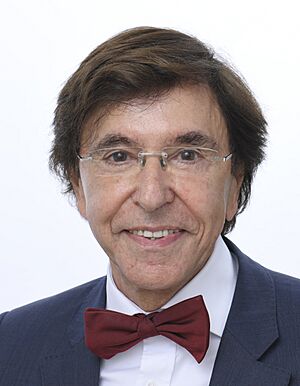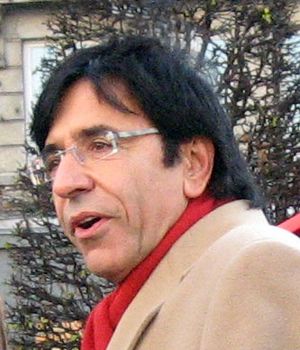Elio Di Rupo facts for kids
Quick facts for kids
Elio Di Rupo
|
|
|---|---|

Official portrait, 2024
|
|
| Prime Minister of Belgium | |
| In office 6 December 2011 – 11 October 2014 |
|
| Monarch | Albert II Philippe |
| Preceded by | Yves Leterme |
| Succeeded by | Charles Michel |
| Minister-President of Wallonia | |
| In office 13 September 2019 – 15 July 2024 |
|
| Preceded by | Willy Borsus |
| Succeeded by | Adrien Dolimont |
| In office 6 October 2005 – 20 July 2007 |
|
| Preceded by | André Antoine |
| Succeeded by | Rudy Demotte |
| In office 15 July 1999 – 4 April 2000 |
|
| Preceded by | Robert Collignon |
| Succeeded by | Jean-Claude Van Cauwenberghe |
| Leader of the Socialist Party | |
| In office 22 November 2014 – 21 October 2019 |
|
| Preceded by | Paul Magnette |
| Succeeded by | Paul Magnette |
| In office 16 September 1999 – 6 December 2011 |
|
| Preceded by | Philippe Busquin |
| Succeeded by | Thierry Giet |
| Mayor of Mons | |
| In office 8 October 2000 – 3 December 2018 |
|
| Preceded by | Maurice Lafosse |
| Succeeded by | Nicolas Martin |
| Member of the European Parliament for Belgium |
|
| Assumed office 16 July 2024 |
|
| Constituency | French-speaking electoral college |
| In office 25 July 1989 – 16 December 1991 |
|
| Member of the Chamber of Representatives | |
| In office 18 December 1987 – 12 July 2019 |
|
| Personal details | |
| Born | 18 July 1951 Morlanwelz, Belgium |
| Political party | Socialist Party |
| Alma mater | University of Mons-Hainaut University of Leeds |
| Signature | |
Elio Di Rupo (born 18 July 1951) is a Belgian politician. He served as the prime minister of Belgium from 2011 to 2014. He also held the position of minister-president of Wallonia three times between 1999 and 2024. He was the first prime minister from the French-speaking part of Belgium since 1979. He was also the first socialist prime minister since 1974. Elio Di Rupo was the first Belgian prime minister whose family came from another country.
Contents
Early Life and Education
Elio Di Rupo was born in Morlanwelz, a town in Wallonia, Belgium. His parents were from Italy. His father passed away in a car accident when Elio was only one year old. His mother had seven children and found it difficult to raise them all by herself. Because of this, three of his brothers grew up in a nearby orphanage.
When he was 12, Elio went to a boarding school. He had some health issues that caused him to repeat his first year of high school twice. However, he later did very well in science subjects. This led him to study chemistry at the University of Mons. He earned a PhD in Chemistry and also spent some time as a part-time teacher at Leeds University in the United Kingdom.
Starting a Political Career
Elio Di Rupo first became involved with the socialist movement while studying in Mons. After finishing his studies, he started his political career in 1980. His first official role was as a Councillor in Mons in 1982. He served in this role until 1985 and then again from 1988 to 2000. In 1986, he became the mayor in charge of health, city improvements, and social issues in Mons.
He also worked for government ministers, helping with finance and energy matters. He became a member of the Chamber of Representatives for the Arrondissement of Mons. In 2000, he became the mayor of Mons, which is an important city in the province of Hainaut.
Key Roles in Government
In 1987, Elio Di Rupo became well-known in national politics. He was elected as a member of the Chamber of Deputies. Two years later, he briefly served in the European Parliament. In 1991, he was chosen as a senator. Soon after, in 1992, he took on his first ministerial job in the French-speaking community, focusing on Education and Media.
In 1994, he joined the federal government as Deputy Prime Minister and Minister of Traffic and Government Companies. After the elections in 1995, he remained the Vice-Prime Minister of Belgium. He was also appointed Minister of Economics and Telecommunications.
In 1999, after federal and regional elections, Elio Di Rupo helped form a new government. He became the minister-president of the Walloon region. However, in October of the same year, he was chosen as the president of his political party, the Socialist Party. He was then succeeded as minister-president in April 2000.
As the new party president, Di Rupo worked to bring new leaders into the Socialist Party and set a new direction. The party had lost many votes in previous elections due to various issues. Di Rupo took steps to make the party stronger. He launched plans like "Contrat d'avenir pour la Wallonie" (Contract for the Future of Wallonia). These efforts helped the Socialist Party regain its strength. In the 2003 elections, the party performed very well, becoming the most important political party.
In 2004, Di Rupo changed the government partners in Wallonia and Brussels. In October 2005, he became Minister-President of Wallonia again. This happened after the previous minister-president resigned. Di Rupo continued to lead his party and worked to address issues within it. He took strong action against corruption in the city of Charleroi, even asking local leaders to step down.
In July 2007, he was re-elected as president of the Socialist Party with a large majority of votes.
Becoming Prime Minister
After the 2010 Belgian general election, the Socialist Party became one of the largest parties in Belgium. There was discussion about whether Elio Di Rupo could become the Prime Minister. He worked hard to improve his Dutch skills, which was important because previous prime ministers had been from the Flemish-speaking part of Belgium.
In May 2011, King Albert II asked Di Rupo to form a new government. This role is called "Formateur." Usually, the person who forms the government also becomes the Prime Minister. Elio Di Rupo became the Prime Minister of Belgium on 6 December 2011.
His appointment ended a very long period of 589 days without a full government in Belgium. This was one of the longest times a developed country had gone without a government.
Other Roles
Between 2004 and 2005, Elio Di Rupo was part of the board of directors for Dexia bank, which is now known as Belfius. A board of directors helps guide a company or organization.
Personal Interests

Elio Di Rupo describes himself as an atheist, a rationalist, and a Freemason. He is fluent in Italian, French, and English. After becoming Prime Minister, he took Dutch lessons to improve his ability to speak the language. He improved enough to give speeches in Dutch and do TV interviews in the language.
Awards and Honours
- Belgium: Knight Grand Cross of the Order of Leopold II
- Belgium: Commander of the Order of Leopold
- Italy: Grand Officer of the Order of Merit of the Italian Republic
See also
 In Spanish: Elio Di Rupo para niños
In Spanish: Elio Di Rupo para niños
- List of openly LGBT heads of government
 | Toni Morrison |
 | Barack Obama |
 | Martin Luther King Jr. |
 | Ralph Bunche |


